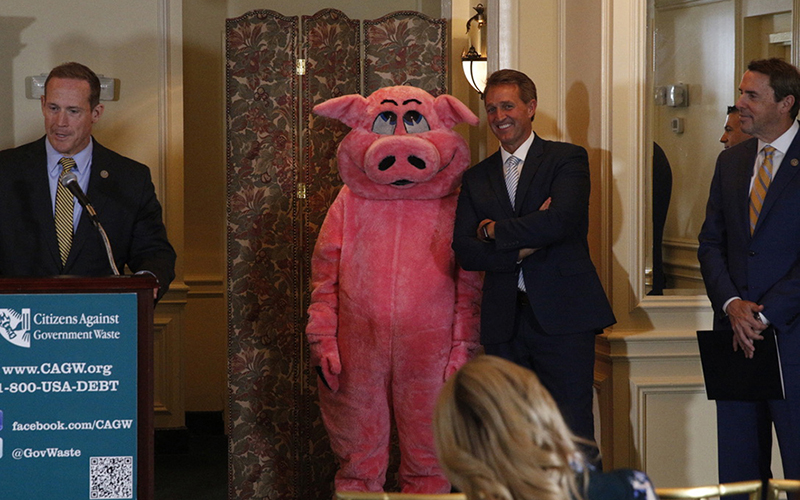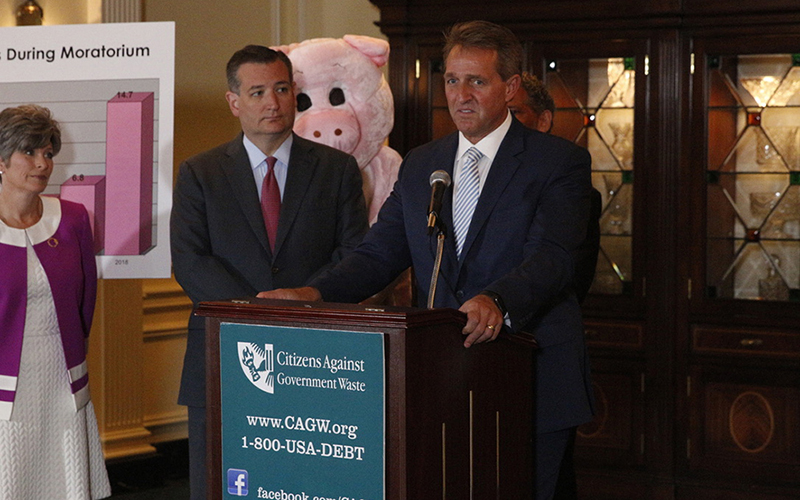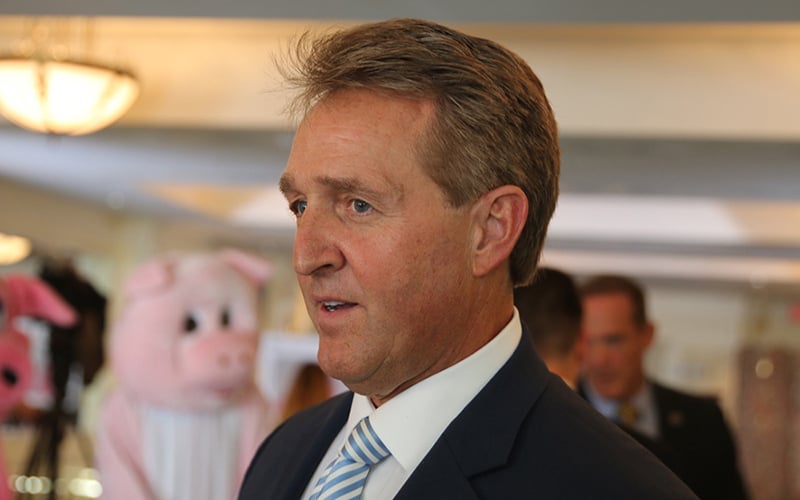
Sen. Jeff Flake, R-Arizona, long a critic of pork-barrel spending, stands with the mascot for the Citizens Against Government Waste’s annual “Pig Book,” which tracks such spending. (Photo by Sarabeth Henne/Cronkite News)

Arizona Sen. Jeff Flake, with fellow GOP Sens. Joni Ernst of Iowa and Ted Cruz of Texas, said the growth of earmarks is all the more reason for a permanent ban on such spending. (Photo by Sarabeth Henne/Cronkite News)
WASHINGTON – Pork-barrel spending more than doubled over the past year, with the federal government allocating $14.7 billion to fund 232 earmarks, according to a report released Wednesday by Citizens Against Government Waste.
The annual Congressional Pig Book said lawmakers continue to win earmarks – spending approvals that circumvent regular budgetary processes – even though they were supposedly prohibited by Congress in 2011.
Some critics have said that ban has helped increase gridlock in Washington by taking away the horse-trading that used to be part of the process of legislating. But lawmakers on hand for the release of the latest report said the soaring numbers are all the more reason to push for a permanent ban on earmarks, which Sen. Jeff Flake, R-Arizona, called the “gateway drug to spending addiction” for lawmakers.
“Some people think that in order to grease the skids and make Congress work better and the parties to work better that you need these items to basically get agreement,” Flake said. “This notion that if you have a bunch of earmarks you can speed the appropriations process just doesn’t wash. All it does is leverage more spending.”
The Pig Book, now in its 26th year, cited everything from a $2.7 billion appropriation for 20 more F-35 Joint Strike Fighters to $13 million for the Save America’s Treasures fund, to help preserve historic locations; $49.6 million for Rural Hospital Flexibility Grants to $663,000 for a brown tree snake eradication program.
Sen. Ted Cruz, R-Texas, called the report “an invaluable tool and resource” that “highlights a process that flourishes in darkness.”

Sen. Jeff Flake, R-Arizona, said congressional earmarks, better known as “pork barrel” spending, is the “gateway drug” for politicians to uncontrolled spending. (Photo by Sarabeth Henne/Cronkite News)
“Earmarks spending, deficits and debt all grow when the lights are turned off, all grow when attention is focused somewhere else and what earmarks, spending, deficits and debt loathe more than anything is sunshine and being revealed,” Cruz said.
Chris Edwards, the director of tax policy studies at the Cato Institute, said he opposes earmarks and welcomes the report – but that it overlooks the larger problem of the rising overall federal debt. He called the amount of money spent on earmarks “just a drop in the bucket” compared to the deficit.
“Earmarks are not the worst fiscal problem with the federal government,” Edwards said. “The worst problem is that … we’re going to have a $1 trillion deficit next year. That’s the big elephant in the room.”
But lawmakers said Wednesday that pork-barrel spending is a good place to start addressing the deficit issue.
Sen. Joni Ernst, R-Iowa, noted that many earmarks pay for agencies and projects that are already getting funding from other organizations.
“The federal government provides millions of dollars for regional commissions that are duplicative of other federal programs,” Ernst said. “Pork should be on our tables, not as part of the federal budget.”
She pointed to past spending by regional commissions that included $100,000 for the Northern Border Regional Commission “to build ski jumps at the Lake Placid Ski Club. The Delta Regional Commission in 2012 awarded $75,000 for a video game incubator. In 2016, the Appalachian Region Commission spent $126,000 on a Center for Chinese Medicine.”
Edwards said the real danger of earmarks extends beyond the direct spending to the possibility that funding for a pork-barrel project is being used by lawmakers as a bargaining chip to pass even costlier bills.
“It’s not so much the amount of money itself,” he said. “The money is used as political leverage … to pass excessively expensive bills.”
Speakers Wednesday agreed that continued vigilance is needed.
“Legislation would permanently ban earmarks which we think is a worthy goal,” Ernst said. “But, unfortunately, as the Pig Book has shown us, we have a lot of work to do yet to eliminate all that pork out there.”
-Cronkite News video by Pat Poblete